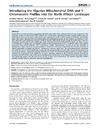Identificador persistente para citar o vincular este elemento:
https://accedacris.ulpgc.es/jspui/handle/10553/46962
| Título: | Introducing the Algerian Mitochondrial DNA and Y-Chromosome Profiles into the North African Landscape | Autores/as: | Bekada, Asmahan Fregel, Rosa Cabrera, Vicente M. Larruga, José M. Pestano, Jose Benhamamouch, Soraya González, Ana M. |
Clasificación UNESCO: | 32 Ciencias médicas 320102 Genética clínica |
Palabras clave: | High-Resolution Analysis Mtdna Haplogroup-H Sub-Saharan Africa Near-Eastern Genetic-Structure, et al. |
Fecha de publicación: | 2013 | Publicación seriada: | PLoS ONE | Resumen: | North Africa is considered a distinct geographic and ethnic entity within Africa. Although modern humans originated in this Continent, studies of mitochondrial DNA (mtDNA) and Y-chromosome genealogical markers provide evidence that the North African gene pool has been shaped by the back-migration of several Eurasian lineages in Paleolithic and Neolithic times. More recent influences from sub-Saharan Africa and Mediterranean Europe are also evident. The presence of East-West and North-South haplogroup frequency gradients strongly reinforces the genetic complexity of this region. However, this genetic scenario is beset with a notable gap, which is the lack of consistent information for Algeria, the largest country in the Maghreb. To fill this gap, we analyzed a sample of 240 unrelated subjects from a northwest Algeria cosmopolitan population using mtDNA sequences and Y-chromosome biallelic polymorphisms, focusing on the fine dissection of haplogroups E and R, which are the most prevalent in North Africa and Europe respectively. The Eurasian component in Algeria reached 80% for mtDNA and 90% for Y-chromosome. However, within them, the North African genetic component for mtDNA (U6 and M1; 20%) is significantly smaller than the paternal (E-M81 and E-V65; 70%). The unexpected presence of the European-derived Y-chromosome lineages R-M412, R-S116, R-U152 and R-M529 in Algeria and the rest of the Maghreb could be the counterparts of the mtDNA H1, H3 and V subgroups, pointing to direct maritime contacts between the European and North African sides of the western Mediterranean. Female influx of sub-Saharan Africans into Algeria (20%) is also significantly greater than the male (10%). In spite of these sexual asymmetries, the Algerian uniparental profiles faithfully correlate between each other and with the geography. | URI: | https://accedacris.ulpgc.es/handle/10553/46962 | ISSN: | 1932-6203 | DOI: | 10.1371/journal.pone.0056775 | Fuente: | PLoS ONE [EISSN 1932-6203], v. 8 (2), (Febrero 2013) |
| Colección: | Artículos |
Citas SCOPUSTM
51
actualizado el 08-jun-2025
Citas de WEB OF SCIENCETM
Citations
52
actualizado el 18-ene-2026
Visitas
178
actualizado el 24-ago-2024
Descargas
927
actualizado el 24-ago-2024
Google ScholarTM
Verifica
Altmetric
Comparte
Exporta metadatos
Los elementos en ULPGC accedaCRIS están protegidos por derechos de autor con todos los derechos reservados, a menos que se indique lo contrario.
